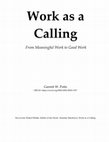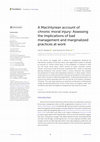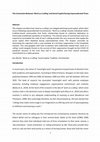Books by Garrett W Potts
This audio discussion highlights the central themes of my monograph, Work as a Calling, and it en... more This audio discussion highlights the central themes of my monograph, Work as a Calling, and it engages with the insightful questions of Edward David, who published a review of my book in Business Ethics Quarterly (BEQ).

Work as a Calling: From Meaningful Work to Good Work, May 5, 2022
Amidst the exponentially growing interest in "work as a calling," contemporary discussions have t... more Amidst the exponentially growing interest in "work as a calling," contemporary discussions have taken an individualistic turn away from the earlier prosocial character that once marked this orientation to work. Now, discussions about "work as a calling" mostly prioritize personal fulfilment via the pursuit of deeply "meaningful work."
Excessive focus has been placed on the experience of meaningful work in ways that are detached from the genuinely good workplace ends that allow for such a meaningful experience to ensue. This book provides a novel paradigm for reimagining the idea of "work as a calling," which serves as a corrective that better supports the individuals’ search for meaning and their contribution to the common good, arguing that the two go hand in hand, and so they cannot be separated. Thus, the key idea captured herein is not simply that scholars have misunderstood the very notion of "work as a calling" by implying that it is essentially just synonymous with meaningful work, but, even more importantly, the point is that scholars and laypersons alike often fail to realize how true meaning ensues as a result of a genuine concern for contributing to human flourishing and the common good through one’s work.
Providing a new perspective on "work as a calling" by examining the issue from the perspective of morality rather than self-actualization, this volume will be of interest to researchers, academics, professionals, and students in the fields of business ethics, management, leadership, and organizational studies.
TABLE OF CONTENTS
Prologue: Finding my Calling
Introduction
1: Who is Your Calling For?
2: Why Every Calling Must Resist Workplace Individualism
3: How to Discern Between ‘True’ & ‘Fake’ Callings
4: Why ‘Fake’ Accounts of Calling Exist & Make People Unhappy
5: A Reason for Hope: Servant Leaders Who Exhibit ‘True’ Callings
Postscript
Edited Volumes by Garrett W Potts

Springer Nature, 2025
This volume offers a cross-disciplinary exploration of Alasdair MacIntyre's provocative approach ... more This volume offers a cross-disciplinary exploration of Alasdair MacIntyre's provocative approach to governance, drawing on insights from philosophy, economics, sociology, business ethics, and organizational studies. The chapters explore how MacIntyre’s theory is applied to diverse institutional contexts, including education, medicine, and technology, addressing contemporary challenges in governance and ethical decision-making.
Bringing together well-known scholars from the 16th Annual Conference of the International Society for MacIntyrean Enquiry (ISME) at the University of Navarra, this book critically examines the role of governing institutions in shaping practices and traditions. It highlights MacIntyre’s distinction between practices and institutions, addressing how these concepts influence ethical governance, leadership, and community-building in today's complex societal landscapes.
Contributors explore key themes such as the development of virtues within institutions, the ethical challenges of artificial intelligence, the moral foundations of education, and the governance of professions like medicine and land management. This volume also engages with contemporary issues, offering practical insights for fostering ethical decision-making and community participation in an increasingly technocratic world.
MacIntyre and the Practice of Governing Institutions is an essential resource for scholars of political philosophy, ethics, and governance, as well as for practitioners looking to navigate the ethical challenges posed by modern institutions. By examining how MacIntyre's thought applies to real-world issues, this book provides both theoretical depth and practical strategies for promoting human flourishing through virtuous governance.
Journal Articles by Garrett W Potts
The Chesterton Review, 2023
Journal of Religion and Health, 2023
One in four American patients now identify as religiously unaffiliated. This study utilizes thema... more One in four American patients now identify as religiously unaffiliated. This study utilizes thematic analysis to deliver qualitative results from in-depth interviews conducted with five chaplains at a premier cancer research institution in Florida to envision what care for their spiritual dimension should look like in practice. It demonstrates why the chaplains interviewed suggested that spiritual caregiving still contributes to their holistic wellbeing, and it suggests how spiritual care and assessments may be provided to so-called religious 'nones'-or those who identify as spiritual but not religious, not religiously affiliated, secular humanist, atheist, agnostic, and so on. We conclude with a novel spirituality assessment for use while serving this patient population.

Frontiers in Sociology - Sec. Work, Employment and Organizations, 2022
In this article, we engage with a theory of management advanced by MacIntyrean scholars of busine... more In this article, we engage with a theory of management advanced by MacIntyrean scholars of business ethics and organization studies to develop an account of "chronic moral injury" in the workplace. In contrast to what we call "acute moral injury," which focuses on grave, traumatic events, chronic moral injury results from poor institutional form-when an individual desiring excellence must function within a vicious institution that impedes the acquisition of virtues and marginalizes practices. In other words, chronic moral injury occurs when practitioners who pursue excellence in their practice work within corrupt or malformed organizations. To demonstrate this point, we recount the events associated with the rise and fall of the biotech company, Theranos. This case study advances an empirical contribution to MacIntyrean studies by demonstrating how chronic moral injury can happen under such conditions and what the negative consequences may entail for workers.

Journal of Business Ethics, 2022
Research evidencing the consequences of the experience of 'calling' have multiplied in recent yea... more Research evidencing the consequences of the experience of 'calling' have multiplied in recent years. At the same time, concerns have been expressed about the conceptual coherence of the notion as studies have posited a wide variety of senses in which both workers and scholars understand what it means for workers to be called, what they are called to do and who is doing the 'calling'. This paper makes both conceptual and empirical contributions to the field. We argue that Bellah et al.'s (Habits of the heart: Individualism and commitment in American life, University of California Press, 1996) contrast between tradition-based and expressivist understandings of 'calling' highlights a fundamental but neglected fissure in the literature. Expressivist accounts amongst both scholars and research participants require only that 'calling' be deeply felt by those who experience it. However, tradition-based accounts require an external caller. Exemplifying this, workers who attest to a divine call and scholars who write about 'calling' in the context of particular Christian traditions understand 'calling' in terms of a relationship with God. These accounts cannot but be in radical tension. We suggest that this conceptual confusion can be understood in terms of MacIntyre's notion of 'tradition-constituted rationality.' The implications of this argument for practice are evidenced in our report of a study of adherents to one such tradition, workers at a Christian organization that supports people in poverty. Through in-depth interviews with long-term volunteers, we seek to assess if tradition-based 'calling' can be evidenced in unpaid work for the lack of pay and career progression opportunities strongly suggest the presence of 'calling.' This study demonstrates that even in the context of work that exhibits duty and altruism associated with expressivist accounts of 'calling,' these workers' understanding of the relationships between themselves, their clients and Jesus Christ dominate their work choices. It is the meaning derived from a divine caller, understood in terms of Christian tradition, that accounts for their decision to begin and to continue this work.

This paper considers the future role and fate of religion in liberal modernity through the eyes o... more This paper considers the future role and fate of religion in liberal modernity through the eyes of two Catholic thinkers, Christopher Dawson and Charles Taylor. It is argued herein that Taylor may be surprised to discover that his analysis of religion and secularism is much more like Dawson's than it is different, despite his criticism of Dawson's backward-looking 'nostalgia' in A Secular Age. Insofar as both figures explain some role that religion ought to play within liberal modernity, they agree that (a) any nostalgic longing for a past religious order is troubling and argue instead for (b) openness to the role of transcendence in the lives of modern persons within liberal modernity. As for the fate of religion in liberal modernity, both figures also (c) deny the idea of progress as it is laid out in what is commonly referred to as the secularization thesis. To the extent that these two figures certainly differ in their views pertaining to the role and fate of religion in liberal modernity, it will also be shown that (d) Dawson makes more explicit theological appeals to the Spirit of God as a vital force that shapes the course of human history.

Business Ethics: A European Review; Wiley Press, 2020
This paper extends an ongoing discussion about establishing a sharper way to conduct ethical inve... more This paper extends an ongoing discussion about establishing a sharper way to conduct ethical investigations into managerial virtue. It does so by relying on Alasdair MacIntyre’s moral philosophy in place of those more dominant approaches taken by scholars who make up the field of positive social science. A connection is drawn herein between a MacIntyrean ‘narrative approach’ to investigating managerial virtue and the idea of ‘work as a calling.’ Specifically, it will be argued that the MacIntyrean-influenced idea of ‘work as a calling’ provides a substantive moral vision that supports an understanding of how virtuous managers ought to narrate their primary workplace motivations. Ultimately, virtuous managers fulfill a ‘political calling’ to support and sustain (a) good work, (b) the good of individual lives, and (c) the common good of communities that their organization reaches. To do this, they must rely on the ‘shepherd virtue’ of practical wisdom (phronesis). Practical wisdom aids virtuous managers’ thinking about achieving the ends of their ‘calling’ as well as any necessary course-corrections that ought to be made toward the better achievement of those good and worthy ends.
News Articles by Garrett W Potts
Fortune Magazine, 2023
Searching for your ‘calling’ can be a source of joy – but also stress and distraction. As it turn... more Searching for your ‘calling’ can be a source of joy – but also stress and distraction. As it turns out, the way that people think about the meaning of work matters. Pursuing meaning in terms of individual success and achievement makes the goal post of happiness become elusive. What if meaning finds us when we’re not so focused on looking for it?
Book Chapters by Garrett W Potts
MacIntyre and the Practice of Governing Institutions, 2025
This chapter explores the impact of "bureaucratic individualism" and profit-centered models on th... more This chapter explores the impact of "bureaucratic individualism" and profit-centered models on the medical profession, specifically examining Chronic Moral Injury (CH-MI). Drawing on Alasdair MacIntyre's philosophy and Farr Curlin and Christopher Tollefsen's critique of the Provider of Services Model (PSM) in healthcare, we argue that the erosion of practical reason-a key element for pursuing excellence in the profession-has dire consequences. Within the PSM, the focus on consumerism and radical patient autonomy hampers medical professionals' ability to make value-informed judgments, contributing to CH-MI and a crisis of purpose. The chapter calls for redefining healthcare models to prioritize human flourishing over corporate interests.
Leadership and Virtues, 1st Edition, Routledge , 2023
This chapter imagines the case of a leader named John who faces a moral dilemma while managing hi... more This chapter imagines the case of a leader named John who faces a moral dilemma while managing his team of developers at a social media organization. We show how John draws on virtues and character traits informed by the paradigm of servant leadership to promote democratic deliberation across his team about how to move forward in light of existent challenges to their organization's noble purpose. The chapter ends with a challenge for all individuals to consider what it might look like to embrace the paradigm of servant leadership within their spheres of influence.

Great Power Competition Volume V: Russia's Invasion of Ukraine, Springer Nature, 2023
This chapter demonstrates the role that displacement can play in generating moral injury (MI) wit... more This chapter demonstrates the role that displacement can play in generating moral injury (MI) within refugee communities. To better understand the consequences of displacement, it considers how individuals' identities and values are formed through their local communities. While there are many reasons that displacement ought to be understood as a potentially morally injurious experience (PMIE), particular attention is given to the negative effects of disorientation, which are associated with displacement. The chapter uncovers multiple facets of disorientation, such as despair, confusion, and apathy. Understanding the morally injurious consequences of displacement marks an important first step toward better serving refugee communities, particularly those citizens of Ukraine who have been forced to flee their homes in the wake of Russian aggression.

Faith Traditions and Practices in the Workplace, Palgrave Macmillan, 2022
This chapter considers how ‘work as a calling’ can mitigate declining social capital, which often... more This chapter considers how ‘work as a calling’ can mitigate declining social capital, which often occurs following unprecedented circumstances. ‘Work as a calling’ situates individuals within tradition-based communities that foster relationships based on collective dedication to historically established standards of excellence. This shared sense of commitment and trust required to accomplish the ends of one’s calling provides the very resources that supply the social capital often depleted during unprecedented times. This chapter concludes by illustrating this argument with a case example of a Christian organization in the hospitality industry. This case grapples with how co-workers who collectively viewed their ‘work as a calling’ could navigate threats to the survival of their organization brought by the COVID-19 pandemic because of the trust they had in one another and their shared normative commitment to a noble purpose.
Great Power Competition Volume IV: Lessons Learned from Afghanistan, Springer Nature, 2023
This chapter aims to carefully distinguish Post-Traumatic Stress Disorder (PTSD) from Moral Injur... more This chapter aims to carefully distinguish Post-Traumatic Stress Disorder (PTSD) from Moral Injury (MI) and review the role of the spiritual dimension in the causation, healing, and prevention of both syndromes. We argue that by giving due consideration to this spiritual dimension, the U.S. military can better prepare soldiers to encounter potentially morally injurious events (PMIEs) in deployment and combat.
Great Power Competition Volume III: CYBERSECURITY, Springer Nature, 2022
In an effort to consider what the U.S. can do to mitigate threats to the relatively new battlefie... more In an effort to consider what the U.S. can do to mitigate threats to the relatively new battlefield of cyberspace, this chapter calls readers' attention to how critical infrastructure and software breaches often happen. Next, the chapter engages with questions regarding who can help us to learn from the breaches further. An answer is provided in light of the ideal type of the 'Cyber Leader'-defined herein as someone who demonstrates craft expertise in the practice of cybersecurity (construed in light of MacIntyrean Business Ethics) to promote the internal goods of privacy and security. A partial account of what virtues cyber leaders require is also sketched before chapter conclusions are drawn.
Great Power Competition Volume II: RADICALIZATION IN THE COVID-19 ERA, Springer Nature, 2021
The COVID-19 pandemic has impacted the U.S. military by impairing not only the physical but also ... more The COVID-19 pandemic has impacted the U.S. military by impairing not only the physical but also the mental and spiritual health of many soldiers. As a result, the pandemic has illuminated a need to think holistically about military service members' human nature to promote their well-being and the U.S. military's readiness. In support of these ends, a tridimensional model of understanding the whole soldier, rooted in lessons learned from COVD-19, is outlined. So as to not omit any vital dimension of a soldier requiring attention and care, this model hinges on an empathetic concern for the body, mind, and spirit of every military service member in a deeply practical and integrated way.
Responsible Leadership: 2nd Edition; Routledge, 2022
This chapter argues that, in place of other dominant forms of leadership, a responsible approach ... more This chapter argues that, in place of other dominant forms of leadership, a responsible approach should not emphasize whether leaders are merely rhetorically persuasive or charismatic, but whether they are virtuous. We must understand that Aristotle’s account of persuasion rests upon rational appeals to morality rather than charismatic arousals of spirit. Toward that end, an Aristotelian construal of servant leadership is framed as a model for how to lead responsibly. This, we argue, entails a conjoining of the forces of practical wisdom and technical competence, directed toward the right ends, so that servant leaders always remain in service to (a) the noble goals of the organization, and (b) the moral development of both themselves and their followers.

The History of Sociology in Britain: New Research and Revaluation, Macmillan Publishers, 2019
Christopher Dawson identified with sociology, wrote extensively for the original Sociological Rev... more Christopher Dawson identified with sociology, wrote extensively for the original Sociological Review, was a stalwart of the Sociological Society in the interwar years, achieved international recognition as a sociologist, engaged with Karl Mannheim and the Moot, and in the postwar period defended meta-history and the sociologically oriented historical work of people like Marc Bloch. He ultimately became regarded as the greatest Catholic historian of the twentieth century, and became a Harvard Professor and a cult figure for American and European Catholics. This paper describes this remarkable trajectory, his absence from the later self-understanding of British sociology, and his key ideas, including his Bellah-like account of the axial age and his extensive response to Weber’s Protestant Ethic and to the extension of these ideas in Ernst Troetlsch.
Book Reviews by Garrett W Potts
Journal of Markets & Morality, Volume 24 (2), 2021











Uploads
Books by Garrett W Potts
Excessive focus has been placed on the experience of meaningful work in ways that are detached from the genuinely good workplace ends that allow for such a meaningful experience to ensue. This book provides a novel paradigm for reimagining the idea of "work as a calling," which serves as a corrective that better supports the individuals’ search for meaning and their contribution to the common good, arguing that the two go hand in hand, and so they cannot be separated. Thus, the key idea captured herein is not simply that scholars have misunderstood the very notion of "work as a calling" by implying that it is essentially just synonymous with meaningful work, but, even more importantly, the point is that scholars and laypersons alike often fail to realize how true meaning ensues as a result of a genuine concern for contributing to human flourishing and the common good through one’s work.
Providing a new perspective on "work as a calling" by examining the issue from the perspective of morality rather than self-actualization, this volume will be of interest to researchers, academics, professionals, and students in the fields of business ethics, management, leadership, and organizational studies.
TABLE OF CONTENTS
Prologue: Finding my Calling
Introduction
1: Who is Your Calling For?
2: Why Every Calling Must Resist Workplace Individualism
3: How to Discern Between ‘True’ & ‘Fake’ Callings
4: Why ‘Fake’ Accounts of Calling Exist & Make People Unhappy
5: A Reason for Hope: Servant Leaders Who Exhibit ‘True’ Callings
Postscript
Edited Volumes by Garrett W Potts
Bringing together well-known scholars from the 16th Annual Conference of the International Society for MacIntyrean Enquiry (ISME) at the University of Navarra, this book critically examines the role of governing institutions in shaping practices and traditions. It highlights MacIntyre’s distinction between practices and institutions, addressing how these concepts influence ethical governance, leadership, and community-building in today's complex societal landscapes.
Contributors explore key themes such as the development of virtues within institutions, the ethical challenges of artificial intelligence, the moral foundations of education, and the governance of professions like medicine and land management. This volume also engages with contemporary issues, offering practical insights for fostering ethical decision-making and community participation in an increasingly technocratic world.
MacIntyre and the Practice of Governing Institutions is an essential resource for scholars of political philosophy, ethics, and governance, as well as for practitioners looking to navigate the ethical challenges posed by modern institutions. By examining how MacIntyre's thought applies to real-world issues, this book provides both theoretical depth and practical strategies for promoting human flourishing through virtuous governance.
Journal Articles by Garrett W Potts
News Articles by Garrett W Potts
Book Chapters by Garrett W Potts
Book Reviews by Garrett W Potts
Excessive focus has been placed on the experience of meaningful work in ways that are detached from the genuinely good workplace ends that allow for such a meaningful experience to ensue. This book provides a novel paradigm for reimagining the idea of "work as a calling," which serves as a corrective that better supports the individuals’ search for meaning and their contribution to the common good, arguing that the two go hand in hand, and so they cannot be separated. Thus, the key idea captured herein is not simply that scholars have misunderstood the very notion of "work as a calling" by implying that it is essentially just synonymous with meaningful work, but, even more importantly, the point is that scholars and laypersons alike often fail to realize how true meaning ensues as a result of a genuine concern for contributing to human flourishing and the common good through one’s work.
Providing a new perspective on "work as a calling" by examining the issue from the perspective of morality rather than self-actualization, this volume will be of interest to researchers, academics, professionals, and students in the fields of business ethics, management, leadership, and organizational studies.
TABLE OF CONTENTS
Prologue: Finding my Calling
Introduction
1: Who is Your Calling For?
2: Why Every Calling Must Resist Workplace Individualism
3: How to Discern Between ‘True’ & ‘Fake’ Callings
4: Why ‘Fake’ Accounts of Calling Exist & Make People Unhappy
5: A Reason for Hope: Servant Leaders Who Exhibit ‘True’ Callings
Postscript
Bringing together well-known scholars from the 16th Annual Conference of the International Society for MacIntyrean Enquiry (ISME) at the University of Navarra, this book critically examines the role of governing institutions in shaping practices and traditions. It highlights MacIntyre’s distinction between practices and institutions, addressing how these concepts influence ethical governance, leadership, and community-building in today's complex societal landscapes.
Contributors explore key themes such as the development of virtues within institutions, the ethical challenges of artificial intelligence, the moral foundations of education, and the governance of professions like medicine and land management. This volume also engages with contemporary issues, offering practical insights for fostering ethical decision-making and community participation in an increasingly technocratic world.
MacIntyre and the Practice of Governing Institutions is an essential resource for scholars of political philosophy, ethics, and governance, as well as for practitioners looking to navigate the ethical challenges posed by modern institutions. By examining how MacIntyre's thought applies to real-world issues, this book provides both theoretical depth and practical strategies for promoting human flourishing through virtuous governance.
The first audience broadly includes an interdisciplinary group of scholars working within business ethics, management, organizational psychology, and vocational psychology, among other fields of study. Amidst these scholars’ exponentially increasing interest in the idea of ‘work as a calling,’ the anatomical structure of their research remains remarkably similar. Their notions of ‘work as a calling’ stress that work should provide individuals with a deep sense of personal fulfillment. In particular, they suggest that work should be a therapeutic source of individual meaning. To secure this meaning, they exhibit an apparent centeredness on the self and an emphasis on the unconstrained pursuit of personal preferences. In most cases, scholars within the ‘work as a calling’ literature tend to proffer notions of ‘meaningful work’ that are divorced from moral considerations about ‘good work.’
While this broad group of scholars copiously references the calling orientation within their research on ‘work as a calling,’ a deep-seated misunderstanding pervades the literature to the extent that notions of ‘meaningful work’ have been divorced from notions of ‘good work.’ To this broader audience, I demonstrate herein that they do not realize how antithetical their scholarly literature on ‘work as a calling’ is to the moral foundation of Bellah et al.’s calling orientation. Namely, I argue that the construal of calling as an orientation to work would not exist within the literature if Bellah et al. had not first articulated the calling orientation as a buffer against the unregulated pursuit of personal preferences. Therefore, I claim that this broader group of scholars either needs to abandon the notion of ‘work as a calling’ or engage with the appropriate virtue framework that undergirds the calling orientation.
I suspect, however, that several of these scholars will be hesitant to take up the virtue framework that is inextricably linked to the calling orientation. For this reason, much of the work following chapter 2 is devoted to a narrower audience of MacIntyrean business ethicists. It is also dedicated to a few scholars from the broader ‘work as a calling’ group whom I trust will not wish to remain accidental contributors to the language of individualism that pervades the literature once I have unmasked it. Perhaps, in time, they will even become MacIntyrean business ethicists.
Indeed, the appropriate moral framework that undergirds the ‘work as a calling’ literature is actively being worked out by a narrower group of MacIntyrean business ethicists, all of whom represent my primary audience for the research herein. To the MacIntyrean community, I hope not only to provide a complete list of tendencies within the ‘work as a calling’ literature that must be resisted, but also a picture of all of the ways that Bellah et al.’s calling orientation is wholly bound up with MacIntyre’s moral philosophy – particularly his theory of the virtues and the common goods that the virtues sustain. Bellah et al.’s calling orientation rests upon a vision of ‘good work,’ and this vision of ‘good work’ hinges on a MacIntyrean account of the virtues that is directed toward the achievement of: (a) the good and worthy ends of workplace practices, (b) the goods of an individual life, and (c) the goods of communities – or, more broadly, the interests of a good society.
Furthermore, it will be shown to the MacIntyrean community that visions of ‘good work,’ which are sustained by the calling orientation, are accompanied by a nuanced vision of pluralistic collaboration that MacIntyre and Bellah et al. share. (I anticipate that this will be surprising to many readers who are familiar with the typical and misleading characterization of MacIntyre as a sectarian). Bellah et al. as well as MacIntyre’s vision of pluralism matters for research on the calling orientation because these figures demonstrate that individuals within the late modern workplace are informed by a plurality of religious and humanistic traditions, all of which account for ultimate meaning and goodness in different ways that ought to be recognized. Distinctive religious and humanistic visions of ultimate meaning indeed impact the perceived goodness of one’s calling. Hence, we must attend to the polysemic and multivocal nature of accounting for the goodness of any one particular calling (i.e., a Buddhist doctor within the Western medical tradition is likely to articulate the goodness of his calling differently than a Jewish doctor working within the Western medical tradition). Still, however, Bellah et al. and MacIntyre’s account entails a hopefulness in the possibility of pluralistic, (or, what I shall call inter-traditional) striving for the achievement of common goods that are practical enough to agree upon.